高中英语必修四第四单元知识点
人教版高中英语必修四 Unit 4--知识点全

[教材P26原句] Tony approached Julia, touched her shoulder and kissed
her on the cheek!
托尼走近朱莉娅,摸了摸她的肩, 并亲了她的脸!
approach v. 接近;靠近;与…接洽
n. 接近;方法;途径;通道
make approaches to sb. 设法接近某人 an approach to sth. 做某事的方法
一份公开的/官方的声明
make a statement on sth
就…发表声明
state n. 国家;州;情形 vt. 规定;声明;陈述
[教
There are many different ways to greet someone
有很多不同的方式来问候别人。
[教材P26原句] After half an hour of waiting for their flight to arrive, I saw several young people enter the waiting area looking around curiously.
等待了半个小时之后,我看到几个年轻人进入了等候区好奇地四处张望。
的方式
指待人接物或思考问题的方式、方法、态度. 常与to搭配 an approach to sth 处理...的方法
[教材P26原句] She stepped back appearing surprised and put up her hands, as if in defence. 她向后退了几步,显得很吃惊,举起双手,好像在自卫。
1. Last week,Susan and David, _B___ our university's student
高中英语必修四unit4知识点
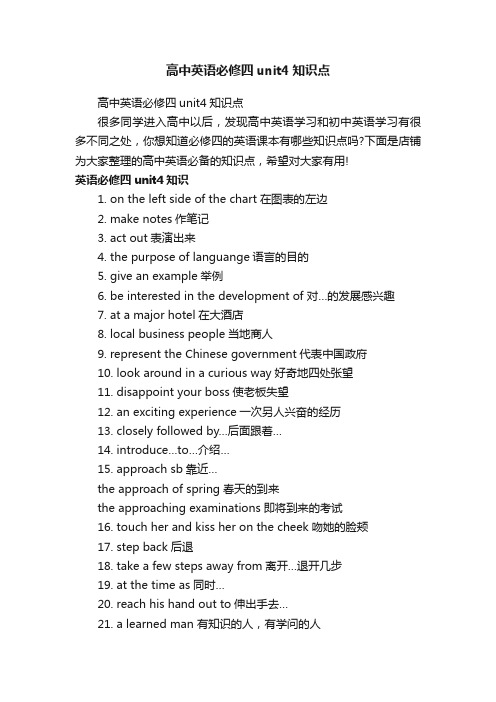
高中英语必修四unit4知识点高中英语必修四unit4知识点很多同学进入高中以后,发现高中英语学习和初中英语学习有很多不同之处,你想知道必修四的英语课本有哪些知识点吗?下面是店铺为大家整理的高中英语必备的知识点,希望对大家有用!英语必修四unit4知识1. on the left side of the chart在图表的左边2. make notes作笔记3. act out表演出来4. the purpose of languange语言的目的5. give an example举例6. be interested in the development of 对…的发展感兴趣7. at a major hotel在大酒店8. local business people当地商人9. represent the Chinese government代表中国政府10. look around in a curious way好奇地四处张望11. disappoint your boss使老板失望12. an exciting experience一次另人兴奋的经历13. closely followed by…后面跟着…14. introduce…to…介绍…15. approach sb靠近…the approach of spring春天的到来the approaching examinations即将到来的考试16. touch her and kiss her on the cheek吻她的脸颊17. step back后退18. take a few steps away from离开…退开几步19. at the time as同时…20. reach his hand out to伸出手去…21. a learned man 有知识的人,有学问的人22. in the same way同样…23. spoken language口语24. express their feelings表达感情25. keep physical distance,保持身体距离高中英语知识重点It 作形式宾语用来替代作宾语的从句、动词不定式、动名词,而把真正作宾语的从句、动词不定式、动名词置于句尾。
高中英语人教必修四unit4单词,短语,重点句型梳理

Unit 4重点单词、短语、句型梳理重点单词●●greet【课文原句】There are many different ways to greet someone using words. (Page 25)【点拨】greet v. 意为"迎接;问候"。
如:He made his way through the crowd to greet us.Bill opened the door to Harold and greeted him with cries of welcome.【拓展】greeting n. 意为"问候;祝贺",是可数名词。
如:"How are you?" is a conventional greeting."Good morning, "I said, but he didn’t return the greeting.【小试牛刀】句型转换。
1. The two students exchanged greetings.= The two students ________ _______ _______.2. We sent him a message, greeting his birthday.= We _______ _______ to his birthday.Key: 1. greeted each other2. sent greetings●●function【课文原句】... the smile —its function is to show happiness and put people at ease. (Page 30)【点拨】function n. 意为"作用,功能"。
如:The machine performs a very important function in our work.【拓展】function v. 意为"起……的作用(常与as连用);运转"。
(完整版)人教版英语必修四unit4知识点以及相应练习(超级好)
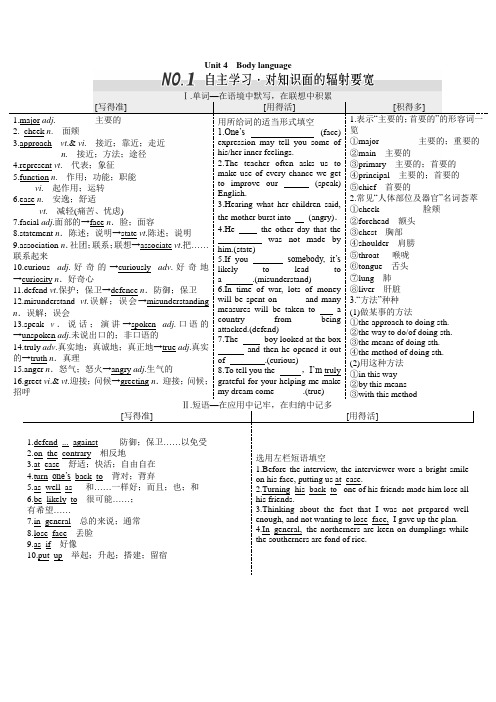
Unit 4Body language[写得准] [用得活] [积得多]1.major adj.主要的2._cheek n. 面颊3.approach vt.& vi. 接近;靠近;走近n. 接近;方法;途径4.represent vt. 代表;象征5.function n. 作用;功能;职能vi. 起作用;运转6.ease n. 安逸;舒适vt. 减轻(痛苦、忧虑)7.facial adj.面部的→face n.脸;面容8.statement n.陈述;说明→state vt.陈述;说明9.association n.社团;联系;联想→associate vt.把……联系起来10.curious adj.好奇的→curiously adv.好奇地→curiosity n.好奇心11.defend vt.保护;保卫→defence n.防御;保卫12.misunderstand vt.误解;误会→misunderstanding n.误解;误会13.speak v.说话;演讲→spoken adj.口语的→unspoken adj.未说出口的;非口语的14.truly adv.真实地;真诚地;真正地→true adj.真实的→truth n.真理15.anger n.怒气;怒火→angry adj.生气的16.greet vi.& vt.迎接;问候→greeting n.迎接;问候;招呼用所给词的适当形式填空1.One’s (face)expression may tell you some ofhis/her inner feelings.2.The teacher often asks us tomake use of every chance we getto improve our (speak)English.3.Hearing what her children said,the mother burst into (angry).4.He the other day that the__________ was not made byhim.(state)5.If you somebody, it’slikely to lead toa .(misunderstand)6.In time of war, lots of moneywill be spent on _____ and manymeasures will be taken to acountry from beingattacked.(defend)7.The boy looked at the box______ and then he opened it outof .(curious)8.To tell you the ,I’m trulygrateful for your helping me makemy dream come ______.(true)1.表示“主要的;首要的”的形容词一览①major主要的;重要的②main 主要的③primary 主要的;首要的④principal 主要的;首要的⑤chief 首要的2.常见“人体部位及器官”名词荟萃①cheek脸颊②forehead 额头③chest 胸部④shoulder 肩膀⑤throat 喉咙⑥tongue 舌头⑦lung 肺⑧liver 肝脏3.“方法”种种(1)做某事的方法①the approach to doing sth.②the way to do/of doing sth.③the means of doing sth.④the method of doing sth.(2)用这种方法①in this way②by this means③with this method[写得准] [用得活] 1.defend_..._against 防御;保卫……以免受2.on_the_contrary 相反地3.at_ease 舒适;快活;自由自在4.turn_one’s_back_to 背对;背弃5.as_well_as_ 和……一样好;而且;也;和6.be_likely_to 很可能……;有希望……7.in_general 总的来说;通常8.lose_face 丢脸9.as_if 好像10.put_up 举起;升起;搭建;留宿选用左栏短语填空1.Before the interview, the interviewer wore a bright smile on his face, putting us at_ease.2.Turning_his_back_to_ one of his friends made him lose all his friends.3.Thinking about the fact that I was not prepared well enough, and not wanting to lose_face,_I gave up the plan.4.In_general,_the northerners are keen on dumplings while the southerners are fond of rice.[单词集成训练]Ⅰ.基础点全练单句语法填空1.Much to his delight, the top student will represent his school (make) a speech at the meeting.2.During World War Ⅱ,when London was bombed, many underground stations functioned ______ shelters.3.It is good to be curious the world around you because I think curiosity is the best teacher.4.The moment she saw her mother, she gave her _big hug.5.Parents, of course, will do everything they could to defend their children harm.6.Shandong Province produced 50 million pounds of apples this year, (rank) second in China.[短语句型集成训练]Ⅰ.基础点全练1.单句语法填空/补全句子①Studies show that people are more likely (suffer) from back problems if they always sit before computer screens for long hours.②general, traffic accidents may happen at a crossroads.③It was quite wrong of him to turn his back his friends when they were in trouble.④It’s too late. Can I put at your home for a night?⑤They were afraid of risking failure because they didn’t_want_to_lose_face (不想丢脸).⑥His mind was (放松) and he felt confident in the future.3.运用所学短语完成下列语段Body language is a way of communication. ①In_general (总的来说), people from different cultures have different ways to greet each other. For example, when we nod at somebody we mean we ②agree_with (同意) his or her opinion. But in some countries, ③on_the_contrary (相反地), nodding one’s head means disagreement. As a result, they ④are_likely_to (可能) have misunderstanding when communicating. So when abroad, we should know we ⑤represent_our_country (代表着我们的祖国) and try not to ⑥lose_face (丢脸); while at home,we should try to put foreigners ⑦at_ease (放松;自在).Ⅰ.单句语法填空1.Being_misunderstood (misunderstand) by others when you do nothing wrong at all is quite a bad experience.2.All the approaches the airport were blocked by the police.3.The doctor will give you some medicine (ease) your pain.4.My sister is in Shandong University, (major) in English literature.5.The kitchen is often the busiest room in a household; it’s important (function) properly.6.If I have any further news, you will be the first person (know).7.When you are playing, watch your tone of voice and (face) expression.8.Soon afterwards he made his first public (state) about the affair.9.She is not an outgoing person and she doesn’t let anyone know what she truly (true) felt.10.(face) with such a difficult task, he turned to his parents for help.Ⅱ.单句改错1.A moment later, the man came out of the washroom and approached to our table2.We’re trying to raise awareness about the environment in generally and air pollution in particular._3.Nurses do all they can to make patients feel with ease.4.Wang Yaping has become the second Chinese woman astronaut work in space.5.People gathered round, curiously to know what was happening.6.He didn’t participate in the oral competitio n,because he didn’t want to lose a face.Ⅲ.用本单元所学知识完成下列写作训练(一)依据提示补全短文Some believe that money is the only □1approach_to (……的途径) being happy, and they □2are_curious_about (对……好奇) how the billionaires earn so much money. ①And some think that if health is gone, they □3are_likely_to_lose_everything (可能会失去一切). Some think feeling comfortable is the most important.Still others believe that money is dignity.They think if they don’t have a lot of money, they will □4lose_face (丢脸). ②They think the first thing that they should consider is to earn enough money.In my opinion, money can’t □5represent_happiness (代表幸福), while being at ease will take away your ambition.In a word, I think health is of great importance.阅读理解·组块专练——练速度(限时:35分钟)Ⅰ.阅读理解AMy grandfather died more than twenty-five years ago. I was fifteenthen. He was kind, strong, fair, and very funny. When I was a youngmusician, hewas my biggest fan. I played my violin for him when he visited,and he loved everything, but each time he had one request. “Could youplay Amazing Grace?” he asked, full of hope and with a twinkle in hiseye, because he knew my answer was always, “I don’t know that one!”We went through this routine at ever y major holiday, and I always figured I’d have time to learn itfor him later.About the time I entered high school and started guitar, Grandpa got cancer. The last time Isaw him alive was Thanksgiving weekend in 1985. My mom warned us that Grandpa didn’t look the same anymore and that we should prepare ourselves. For a moment I didn’t recognize him. He looked so small among all the white sheets. We had all gathered in Ohio for the holiday, and I’m sure we all knew we were there to say good-bye. I can see now that Grandpa held on long enough to see us each one more time. I remember how we ate in the dining room and laughed and talked while Grandpa rested in his hospital bed. I wonder if it was sad for him to be alone with our voices and laughter.Knowing Grandpa, he was probably content.The next morning I found my moment alone with him. I pulled out my guitar, tuned to his appreciative gaze, and finally played for him Amazing Grace. I had worked on it for weeks, knowing it never mattered whether I actually played it well and choosing not to believe as I played that it was my last concert for my biggest fan. The cancer had stolen his smile, but I saw joy in his eyes. He held my hand afterward, and I knew I had done something important.I argued with people all through college about my music major. I was told by strangers that music wouldn’t make me any money and it wasn’t useful like being a doctor. But I know first-hand that with music I was able to give my grandpa something at a point when no one else could.1.At first the author didn’t play Amazing Grace for Grandpa because ________.A.she hadn’t learned it yetB.she found it difficult to playC.she disliked playing itD.her grandfather was just joking2.From the last sentence in Paragraph 2 we can infer that Grandpa ________.A.treasured love from familyB.was used to living aloneC.was too weak to feel anythingD.was optimistic about his health3.When the author finally played Amazing Grace for Grandpa, she________.A.made him smile joyfullyB.knew she must play it wellC.brought him love and comfortD.believed she could play it many times for himBA recent survey in the United States showed that the average familyspent more money on its pets than on its children. Although rathershocking, it should not surprise anyone who has seen the doggy parlors(客厅) where loved pets rest. Are Americans unique in treating theirlittle friends in this way? No, the English, too, pay more attention totheir pets.This can clearly be seen when we look at pet foods, which often contain more vitamins than human food. They certainly cost much. Last year the British public spent two hundred million pounds on pet food alone, to say nothing of veterinary bills or animal furniture. It is difficult not to feel angry about this when considering what the same amount could do for victims of starvation and poverty, so it is not unusual for me to_get_hot_under_collar_when I read an old man left all his money to his dog instead of his children.There are a variety of reasons why I find pets-raising alarming. They cause physical problems. An example of this is New York where they have great difficulty getting rid of the mess that dogs leave on the streets. Many people find this funny, but in a number of large cities it is a major problem. Animals can cause disease, too. It is the threat of rabies — a disease with no known cure.Another problem is the carelessness of pet owners. Most little children want a dog or a cat, and they continually push their mothers and fathers until they get on e. It is only when the “sweet little thing” has been brought home that the parents realize how much time and money must be spent on “Rover” or “Bonzo”. Then they just abandon it. As a result, they are allowed to run free. English farmers lose hundreds of s heep a year, killed by someone’s pet and you must have read of children being hurt by some pets of their own.Lastly, I would only suggest that we have got our priorities wrong and that something should be done about it. In my view, it’s time we stopped be ing sentimental about pets. I can see no reason why we should get upset when animals are cut up for medical experiments. This will lead us to discover cures for serious human diseases, and then I say, “Keep cutting!”语篇解读:本文是一篇说明文。
高中英语必修四第四单元重点

高中英语必修四第四单元重点、难点Unit Four Body language1、Yesterday, another student and I, representing our university’s student association, went to the Capital International Airport to meet this year’s international students.昨天,我和另一个学生代表我们学校的学生会,到首都国际机场去迎接今年的国际学生。
represent vt. 代表;代理用法归纳:(1)represent oneself as / to be…自称是…;自言He represented himself to be a member of our group. 他自称自己是我们小组的成员。
Don’t represent yourself as a leader. 别自称自己是领导。
(2)represent sth. to sb. 阐述;表达Let me represent my idea to you in another way. 让我用另一种方式向你表达我的观点。
Can you represent it to us in detail. 你能详细向我们叙述吗?(3)represent sth. 代表;代理You two will represent our school at the meeting. 你俩个代表我们学校去开会。
2、Tony approached Julia, touched her shoulder and kissed her on the check.托尼走近茱莉亚,摸了摸她的肩,亲了亲她的脸。
approach v.用法归纳:(1)走近;接近When you approach him, walk softly and slowly. 接近他的时候,慢慢地、轻轻地走。
高中英语必修四unite4知识点
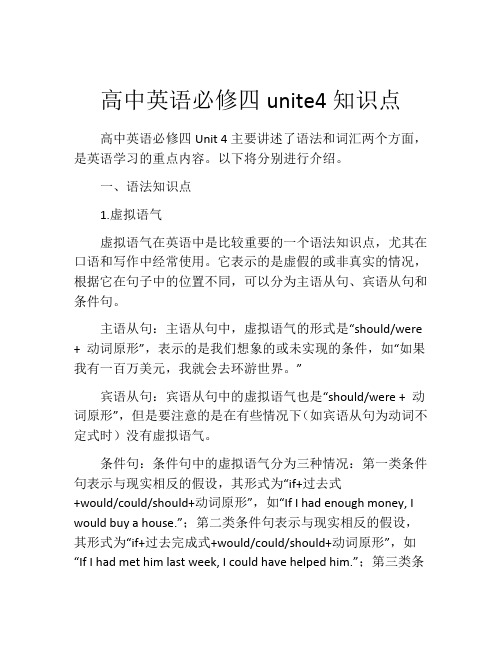
高中英语必修四unite4知识点高中英语必修四Unit 4主要讲述了语法和词汇两个方面,是英语学习的重点内容。
以下将分别进行介绍。
一、语法知识点1.虚拟语气虚拟语气在英语中是比较重要的一个语法知识点,尤其在口语和写作中经常使用。
它表示的是虚假的或非真实的情况,根据它在句子中的位置不同,可以分为主语从句、宾语从句和条件句。
主语从句:主语从句中,虚拟语气的形式是“should/were + 动词原形”,表示的是我们想象的或未实现的条件,如“如果我有一百万美元,我就会去环游世界。
”宾语从句:宾语从句中的虚拟语气也是“should/were + 动词原形”,但是要注意的是在有些情况下(如宾语从句为动词不定式时)没有虚拟语气。
条件句:条件句中的虚拟语气分为三种情况:第一类条件句表示与现实相反的假设,其形式为“if+过去式+would/could/should+动词原形”,如“If I had enough money, I would buy a house.”;第二类条件句表示与现实相反的假设,其形式为“if+过去完成式+would/could/should+动词原形”,如“If I had met him last week, I could have helped him.”;第三类条件句表示可能发生的情况,其形式为“if+现在式+will/can/should+动词原形”,如“If I have time tomorrow, I will help you.”2.被动语态被动语态在英语中也是一项基本的语法知识点,其句子的主语是被动的,动作的执行者则成为状语,主语可以是各种词类,而被动语态的形成则是将动词的过去分词加上助动词“be”。
被动语态的应用:在写作中被动语态可以强调动作的执行者或结果,可以包含更多的信息,比如说,科技论文中常常应用被动语态来描述实验的程序和结果。
二、词汇知识点1.词根、前缀和后缀词根、前缀和后缀对于学习英语单词是非常有帮助的,在语音、语法和意义的理解方面都有很大的作用。
高中英语必修四Unit4知识点归纳

高中英语必修四Unit4知识点归纳【重点词汇、短语】1. represent 代表,象征2. approach 接近,靠近3. defend 保护,保卫4. defend against 保卫…以免受5. likely 可能的6. be likely to 很可能7. in general 总的来说,通常8. ease 安逸,减轻9. at ease 舒适,自由自在10. lose face 丢脸11. turn one’s back to 背对,背弃【重点句型】1. The first person to arrive was Tony Garciafrom Colombia, closely followed by Julia Smith from Britain.第一个到达的是来自哥伦比亚的托尼•家西亚,随后紧跟着的是来自英国的茱莉亚•史密斯。
△句中closely followed by…是过去分词短语作伴随状语,一般现在分词作伴随状语的时候较多,但如果伴随的动作与所修饰的名词构成被动关系,则用过去分词。
2. Not all cultures greet each other the sameway, nor are they comfortable in the same way with touching or distance betweenpeople.各种文化背景下的人们互致问候的方式不尽相同,身体接触的程度和相互间距离也并不一样。
△本句中not all“并不是所有的”,是部分否定,在英语中有一些用来表示“全体”或“完全”意义的总括词,如all, both, every, everything, entirely, completely 等,与not 连用时,无论not 在它们前面还是后面,都构成部分否定,意为“并非所有……都”,“并非每一……都”。
3. These actions are not good or bad, but aresimply ways in which cultures have developed.这些行为都无所谓好坏,只不过是文化发展的不同方式而已。
高中英语必修四Unit4知识归纳
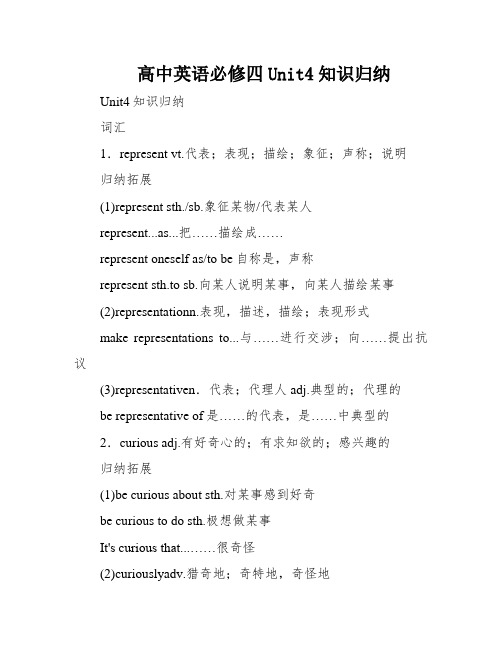
高中英语必修四Unit4知识归纳Unit4知识归纳词汇1.represent vt.代表;表现;描绘;象征;声称;说明归纳拓展(1)represent sth./sb.象征某物/代表某人represent...as...把……描绘成……represent oneself as/to be自称是,声称represent sth.to sb.向某人说明某事,向某人描绘某事(2)representationn.表现,描述,描绘;表现形式make representations to...与……进行交涉;向……提出抗议(3)representativen.代表;代理人adj.典型的;代理的be representative of是……的代表,是……中典型的2.curious adj.有好奇心的;有求知欲的;感兴趣的归纳拓展(1)be curious about sth.对某事感到好奇be curious to do sth.极想做某事It's curious that...……很奇怪(2)curiouslyadv.猎奇地;奇特地,奇怪地curiosityn.猎奇心;猎奇;珍品,奇事in/with curiosity=curiously猎奇地from/out of curiosity出于好奇meet/satisfy one's curiosity满足或人的猎奇心3.approach n.接近,迫临,走近;方法,步调,途径,门路vt.接近,建议;要求,找……商量vi.靠近归纳拓展(1)at the approach of...在快到……的时候make an approach to...对……进行探讨;向……提出要求/建议an/the approach to sth.(待人接物或思考问题的)方法、方式、态度(2)approach sth.与或人联系/磋商某事approach to...接近,近似;约等于;做某事的方法/途径同类辨析approach,way,method与means(1)approach,way,method,means都有“体式格局,方法,途径”之意,但approach偏重指待人接物或考虑问题的体式格局;way为普通用语;means指能够获得结果的手腕、方法;method指有规律的、有条理的做法,如教学方法teaching method。
人教版必修四第四单元核心词汇和短语
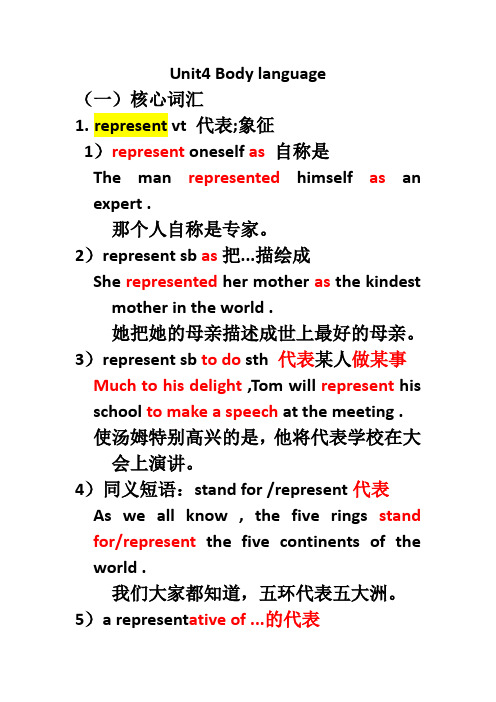
Unit4 Body language(一)核心词汇1.represent vt 代表;象征1)represent oneself as 自称是The man represented himself as an expert .那个人自称是专家。
2)represent sb as把...描绘成She represented her mother as the kindestmother in the world .她把她的母亲描述成世上最好的母亲。
3)represent sb to do sth 代表某人做某事Much to his delight ,Tom will represent his school to make a speech at the meeting . 使汤姆特别高兴的是,他将代表学校在大会上演讲。
4)同义短语:stand for /represent代表As we all know , the five rings stand for/represent the five continents of the world .我们大家都知道,五环代表五大洲。
5)a represent ative of ...的代表a representative of the meeting会议的代表2.curious adj 好奇的1)be curious about sth 对...感到好奇be curious to do sth 很想做某事Tom is curious about the origin of mankind .汤姆对人类的起源感兴趣。
2)out of curiosity 出于好奇meet /satisfy one’s curiosity满足某人的好奇心with curiosity=curious ly好奇地Out of curiosity , all the other students were curious to know why the teacher praised me .出于好奇,其他所有的学生都想知道老师为什么表扬我。
人教版高中英语必修四-第四单元-Body-language-知识点讲解

4. They had a large__m__a_jo_r_i_ty_ (major) over the other party at the last election.
4. 名词作宾语。
5. All our officers are trained
_t_o__d_e_fe_n_d_ (defensive) ourselves against knife attack. 5. 不定式表示目的。
3. __sp_e_a_k____ v.谈话,讲话 _s_p_e_e_c_h___ n. 发言 __sp__o_k_e_n__ adj.口语的
4. _d__ef_e_n_c_e___ n.防御,保卫 _d_e_f_e_n_d____ v. 防御,保卫 _d__ef_e_n_s_iv_e____ adj. 防御的,保卫的
6) A
3.The first person to arrive was Tony Garcia from Colombia, closely followed by Julia Smith from Britain. (Page 26) 第一个到达的是从哥伦比亚来的托尼·加西亚,紧随其 后的是英国的朱莉娅·史密斯。
They will be meeting at a major hotel 2
_w__it_h_ local business people and people 3_w__h_o_ represent the Chinese government. Four people enter looking around 4 _in_ a curious way. You do not want to disappoint your boss,and this is an 5_e_x_c_i_ti_n_g_ (excite) experience for you,So you stand watching and 6_l_is_t_e_n_in_g__ (listen).
高中英语必修4unit4课文知识点讲解.ppt
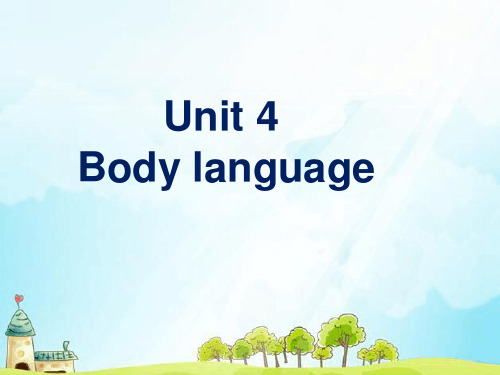
2.likely
However,people from places like Spain,Italy or South American countries approach others closely and are more _l_i_k_e_ly__ to touch them.(P26) 观察思考 Snows are likely to happen in the next 24 hours. One likely result of this heavy rain is the rising of the river. It’s highly likely that he will succeed.
(2)likely既可以用人也可以用物作主语,常用句型是: It is likely that...或sb./sth.is likely to...。
(3)possible和probable都不能以人作主语,常用句 型有: Possible常用It is possible (for sb.) to do sth.
二.重点单词
1.represent
Yesterday,another student and I,_r_e_p_r_e_s_e_n_t_i_n_g our university’s student association,went to the Capital International Airport to meet this year’s international students. (P26) 观察思考 The carvings represent a hunting scene.
He represented our school to take part in the competition and all of us were proud of him. 归纳总结 represent ___v_t._代_表__;__描__绘_;__表__现__。 (1)represent...as...把……描绘成……
高中英语必修四Unit4知识要点回顾

高中英语必修四Unit4知识要点回顾本文档回顾了高中英语必修四Unit4的知识要点,以下是重点内容概述:1. 词汇:本单元的词汇主要包括历史事件和文化方面的词汇。
学生需要掌握这些词汇的拼写、发音以及用法。
词汇:本单元的词汇主要包括历史事件和文化方面的词汇。
学生需要掌握这些词汇的拼写、发音以及用法。
2. 阅读理解:本单元的阅读理解重点是理解文章中的主旨、细节和推理等,同时也需要学生提高阅读速度和理解技巧。
阅读理解:本单元的阅读理解重点是理解文章中的主旨、细节和推理等,同时也需要学生提高阅读速度和理解技巧。
3. 写作技巧:本单元要求学生以辩论的方式撰写文章,并且要能够清楚陈述观点并支持自己的观点。
学生需要学会使用适当的过渡词语和句子结构。
写作技巧:本单元要求学生以辩论的方式撰写文章,并且要能够清楚陈述观点并支持自己的观点。
学生需要学会使用适当的过渡词语和句子结构。
4. 语法重点:本单元的语法重点是情态动词和虚拟语气的用法。
学生需要掌握情态动词的不同用法和虚拟语气的表示方式。
语法重点:本单元的语法重点是情态动词和虚拟语气的用法。
学生需要掌握情态动词的不同用法和虚拟语气的表示方式。
5. 听力训练:学生需要通过听力练来提高自己的听力技巧,包括理解对话中的信息以及提取关键词汇和句子。
听力训练:学生需要通过听力练习来提高自己的听力技巧,包括理解对话中的信息以及提取关键词汇和句子。
通过对这些知识要点的回顾和巩固,学生可以更好地理解和掌握高中英语必修四Unit4的内容。
在学习过程中,建议学生通过阅读相关材料、参加讨论和练习来提高自己的英语能力。
高中英语必修4unit4课文知识点讲解(课堂PPT)
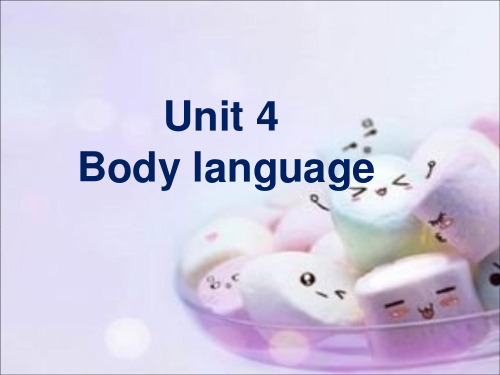
归纳总结 agreement __n_.协__议__;_一__致__;__同_意___。 1.Sign an agreement签定协议 1.break an agreement违反协议 3.reach/make an agreement达成协议 4.under an agreement根据协议 5.in agreement (with)(意见等)一致
即学即用 (1)对你周围的世界感到新奇是件好事。
It is good to _b_e__c_u_r_i_o_u_s__a_b_o_u_t_ the world around you. (2)我很想知道孩子们在做什么。
I’m _c_u_r_i_o_u_s__t_o__k_n_o_w_ what the children are
negotiations.
重点短语与句型
6.at ease
The most universal facial expression is,of course, the smile—its function is to show happiness and
at ease put people _______.(P30) 观察思考 1.He is at ease about the matter. 2.When you feel nervous,you’d better listen
—What does the E stand for?
——E代表什么? 即学即用 (1)她把自己描绘成世界上最好的母亲。
She Represents herself as the kindest
mother in the world.
(2)那个国家的外交部长代表该国出席了会议。
The country __w_a_s__r_e_p_r_e_s_e_n_t_e_d__a_t__t_h_e__c_o_n_f_e_r_e_n_ce
高中英语必修四Unit 4 课文详解 4 unit 4

必修四 Unit 4 Body Language 肢体语言II.Reading COMMUNICATION: NO PROBLEM交流:没有问题吗Yesterday, another student and I, representing our university's student association, went to theCapital International Airport to meet this year's international students.昨天,我和另一个学生代表我们大学的学生会到首都国际机场迎接今年的国际生。
【注释:representing our university's student是现在分词短语作状语,该分词与句子主语“another student and I”之间的逻辑关系为主谓关系。
也有把representingour uninersity's student association看作非限制性定语(相当于who represented our university's studentassociation.)考题:1. (09申-31) A small plane crashed into a hillside five miles east of the city, ____ all four people on board.A. killedB. killingC. killsD. to kill2. (09湘-25) At the age of 29, Dave was a worker, ____ in a small apartment near Boston and______ what to do about his future.A. living; wonderingB. lived; wonderingC. lived; wonderedD. living; wondered3. (09辽-22) When we visited my old family home, memory came _____ back.A. floodingB. to floodC. floodD. flooded4. (08全II-9) ——What are you reading, Tom——I'm not really reading, just _____ the pages.A. turning offB. turning aroundC. turning overD. turning up5. (08京-24) ______ that she was going off to sleep, I asked if she'd like that little doll on her bed.A. SeeingB. To seeC. SeeD. Seen6. (08重-29) _____ to reach them on the phone, we sent an email instead.A. FailB. FailedC. To failD. Having failed BAACAD They 】were coming to study at Beijing University.他们要来北大学习。
必修四 第四单元知识点

必修四Body language Teaching Plan知识目标掌握必修四第四单元的重点词汇及相关短语,并能用它们完成写作部分的任务。
I.Learning aims;1.Review some useful words and expressions in unit4Book4:statement greet represent association flight curious approach defendcheek major dash spoken crossroads posture facial misread function subjective hug ease truly kiss sb. on the cheek, defend against, dash in / out / into / out of,be likely to, in general, at the crossroads, put sb. at ease, lose face,turn one’s back to, be respectful to2. To learn some useful sentences patterns.1、She stepped back appearing surprised… as if in defence. (现在分词作伴随状语;as if引导省略句)2、Not all cultures greet each other the same way, nor are they comfortable in the same way.(not…nor…不…也不…;否定词置句首,句子采用倒装)3、In most places around the world, frowning and turning one’s back to someone shows anger.(v.-ing作主语)能力目标Improve students listening, reading and writing abilities。
高中英语必修四第四单元知识点.doc

Unit four Earthquakes1. burst 爆裂,突发The square is bursting with tourists. 广场上到处都是游客。
I felt as if my heart would burst with joy. 我觉得自己快乐得心花怒放。
The police burst through the door. 差人破门而入。
There was a burst of laughter in the next room. 近邻房间里忽然爆宣布一阵笑声。
联想扩展:(1) burst in on 突然⋯打断He burst in on our conversation. 他忽然打断了咱们的说话。
(2) burst into +n. 突然⋯The speaker burst into angry speech. 演讲者忽然讲粗话。
(3) burst out + doing 突然⋯The woman burst out crying like a child. 那个妇女忽然像小孩相同哭了。
(4) burst to do sth. 迫切想做某事I am bursting to tell you the news. 我刻不容缓的想告知你这个音讯。
2. suffer用法概括:A, 遭受痛苦 He suffered terribly when his mother died.B, 遭到丢失 If I lost, my self-esteem will suffer.C, 遭受He suffered no pain联想扩展:suffer from1、受⋯之苦I suffered most from lack of rest.2、患⋯病I am suffering from a cold.特别提示:suffer 表明“患⋯病”时,后边一般跟疾病称号。
_______ such heavy pollution already , it may now be too late to clean up the river .A. Having sufferedB. SufferingC. To sufferD. Suffered3. reach用法概括:(1)抵达The started early, hoping to reach there before dark. 它们很早就动身,期望天亮前抵达那里。
高中英语必修四unite4知识点
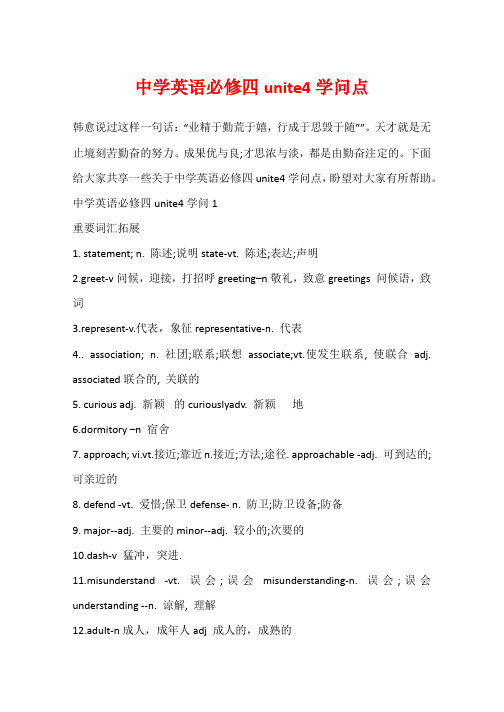
中学英语必修四unite4学问点韩愈说过这样一句话:“业精于勤荒于嬉,行成于思毁于随””。
天才就是无止境刻苦勤奋的努力。
成果优与良;才思浓与淡,都是由勤奋注定的。
下面给大家共享一些关于中学英语必修四unite4学问点,盼望对大家有所帮助。
中学英语必修四unite4学问1重要词汇拓展1. statement; n. 陈述;说明state-vt. 陈述;表达;声明2.greet-v问候,迎接,打招呼greeting–n敬礼,致意greetings 问候语,致词3.represent-v.代表,象征representative-n. 代表4.. association; n. 社团;联系;联想associate;vt.使发生联系, 使联合adj. associated联合的, 关联的5. curious adj. 新颖的curiouslyadv. 新颖地6.dormitory –n 宿舍7. approach; vi.vt.接近;靠近n.接近;方法;途径. approachable -adj. 可到达的;可亲近的8. defend -vt. 爱惜;保卫defense- n. 防卫;防卫设备;防备9. major--adj. 主要的minor--adj. 较小的;次要的10.dash-v 猛冲,突进.11.misunderstand -vt. 误会;误会misunderstanding-n. 误会;误会understanding --n. 谅解, 理解12.adult-n成人,成年人adj 成人的,成熟的13. spoken- adj. 口语的unspoken-adj. 非口语的;未说出口的14. function-n 作用,动能,只能v-起作用,运转15.likely-- adj. 可能的16.false—adj 错误的,假的true 真的,正确的17.ease--n. 安逸;舒适vt.减轻(苦痛;忧虑)easeful--adj.舒适的, 安逸的18. truly-- adv. 真实地;真诚地;真正地true--adj. 真实的,真正的19. anger- n. 怒气;怒火angry-- adj. 生气的中学英语必修四unite4学问2重点短语梳理1. defend against保卫…以免受2.intruduce sb to sb 向某人介绍某人3.kiss sb on some part亲吻某人的某个部位4.in defence 防备,保障5.together with 与某人一起6.be likely to 很可能…;有盼望…7.reach one’s hand out to sth 把手伸出来取某物8.on the contrary 相反9.nod at sb 向某人点头10.greet sb with/by 通过…向某人问候11.express one’s feelings表达某人的感情12. in general 总的来说;通常13.at a job fair 在求职会上14.be nervous about 对… 感到惊惶15. at ease 舒适;开心;逍遥自由16. lose face丢脸17.turn one’s back to 背对;背弃18.turn one’s head away 把头转过去19.be willing to 渴望…., 情愿….20. look upset about sth 对..感到沮丧中学英语必修四unite4学问3重点句型再现1. I saw several young people enter thewaiting area looking around curiously.我望见几个年轻人走进了等候区,新颖地向四周张望。
- 1、下载文档前请自行甄别文档内容的完整性,平台不提供额外的编辑、内容补充、找答案等附加服务。
- 2、"仅部分预览"的文档,不可在线预览部分如存在完整性等问题,可反馈申请退款(可完整预览的文档不适用该条件!)。
- 3、如文档侵犯您的权益,请联系客服反馈,我们会尽快为您处理(人工客服工作时间:9:00-18:30)。
Unit four Earthquakes1. burst爆裂,突发The square is bursting with tourists. 广场上到处都是游客。
I felt as if my heart would burst with joy. 我觉得自己高兴得心花怒放。
The police burst through the door. 警察破门而入。
There was a burst of laughter in the next room. 隔壁房间里突然爆发出一阵笑声。
联想扩展:(1) burst in on…突然打断He burst in on our conversation. 他突然打断了我们的谈话。
(2) burst into +n. 突然…The speaker burst into angry speech. 演讲者突然讲粗话。
(3) burst out + doing突然…The woman burst out crying like a child. 那个妇女突然像小孩一样哭了。
(4) burst to do sth. 迫切想做某事I am bursting to tell you the news. 我迫不及待的想告诉你这个消息。
2. suffer用法归纳:A, 受苦He suffered terribly when his mother died.B, 受到损失If I lost, my self-esteem will suffer.C, 遭受 He suffered no pain联想扩展:suffer from1、受…之苦I suffered most from lack of rest.2、患…病I am suffering from a cold.特别提示:suffer表示“患…病”时,后面一般跟疾病名称。
_______ such heavy pollution already , it may now be too late to clean up the river .A. Having sufferedB. SufferingC. To sufferD. Suffered3. reach用法归纳:(1)到达The started early, hoping to reach there before dark. 它们很早就出发,希望天黑前到达那里。
易混辨析:reach; get; arrive 到达reach后直接加地点;get加to再加地点;arrive后加at/ in再加地点,at 后加小地点;in 后加大地点。
如果表示地点的词是副词,get和arrive后都不能用介词。
另外,只表示“到了”,不强调到什么地方用arrive。
(2)达到The number of the students in our school will reach 2000 next year.(3)用手或脚够到Can you reach the book on the top of the shelf? 你能够到书架顶上的那本书吗?特别提示:reach还可以作名词,表示“用手或脚能够到的范围;管辖范围或臂展”。
Please pass me the salt, it’s out of my reach. 请把盐递给我,我够不到。
(4)传到某人手中/耳中Your letter reached me yesterday. 我昨天收到你的来信。
The news reached me just now. 我刚刚听到那个消息。
(5)通向;延伸Where does this road reach? 这条路通向哪里?即时活用:1、Most children stay at home until they ____ school age.A. geteC. reachD. arrive2、Dear Jenny, thank you for your letter which ______ on April 1st.A. arrivedB. arrived atC. arrivingD. arrived me3、It is _______that the letter will ____you this afternoon.A. most like; arriveB. likely; reachC. mostly like; getD. best like; reach4. cover(1)覆盖The playground is covered by fallen leaves, we should clean it. 特别提示:表示“覆盖”时,常用cover…with / by句型,并且译法比较灵活。
I am covered by dust. 我满身都是土。
She covered her face with her hands. 她用双手捂着脸。
(2)包括;包含;涉及The study of physics covers many subjects.(3) 保护;掩护The mother covered the baby from the falling ceiling.母亲保护婴儿不受下落的天花板的伤害。
(4)走完多少路;看完多少页书。
I can cover 100 Li on foot a day. 我一天不行能走100里。
How many pages have you covered? 你看完了多少页书?(5)占多大面积Our school covers an area of 60.000 square meters. 我们学校占地60000平方米。
特别提示:表示“占多大面积”用…covers an area of +数词。
(6)采访The chief editor sent a reporter to cover the event. 主编派了一记者去采访整个事件。
1、The farm is huge, lying between the valleys, and ____ an area of 15 square kilometers.A. coveredB. being coveredC. coveringD. covers2、This is a long hard winter, with everything _______ white.A. coveredB. covered byC. coveringD. covering with3、This book is said to be a special one which ________ many events not found in other history books.A. writesB. coversC. printsD. reads4、This is a long hard winter, with everything _______ white.A. coveredB. covered byC. coveringD. covered with5、The farm is huge, lying between the valleys, and ____ an area of 15 square kilometers.A. coveredB. being coveredC. coveringD. covers5. dig out挖出;发现;捐钱It is not easy to dig out the past. 发掘过去的历史是不容易的。
He was buried by an avalanche and had to be dug out. 他遇雪崩被埋住了,得把他挖出来。
联想扩展:dig down 挖下dig in 开始细致的工作dig at 挖苦;嘲笑某人dig deep 挖深;挖出来dig for 发掘;搜集dig into 钻研dig up 掘起;挖出6. 表示方位的介词in / on / to / off用法归纳:(1)in 表示在范围里的某个方向Shanghai is in the east of China. 上海在中国的东部。
(2) on表示接壤Canada is on the north of the USA. 加拿大在美国北边。
(3) to表示不在范围里,也不接壤Japan lies to the east of China. 日本在中国东边。
特别提示:上边的句子可以改写为:Japan lies east of China.或者East of China lies Japan.改正过的句子省略了介词to,原因在于表示方向的名词还可以作副词,表示“在什么方向”或“去什么方向”。
(4) off 表示A. 在范围里但不接壤(多指各国的岛屿)Taiwan is off the east of China. 台湾在中国的东部。
B. 在离…不远处My house is off the main road. 我家离大路不远。
1、Taiwan lies______ the southeast of Fujian, which is ______ southeast of China.A. in; onB. to; inC. on; inD. to; on2、They traveled ________, all the way up to Wisconsin .A. the northB. in the northC. northD. the south7. keep / stop /prevent…from doing防止/阻止…发生What prevented you from coming on time? 什么事情使你没有按时到?主动句中,stop和prevent 后的from可以省略,keep后的from不能省略。
被动句中,三个词后面的from都不能省略。
即时活用:It seems very difficult _________.A. to stop the child to cryB. preventing the child cryingC. to keep the child from cryingD. holding the child’s crying8. make sure = be sure(1) + to do 一定;务必Be sure to come on time this afternoon. 下午一定要按时到。
